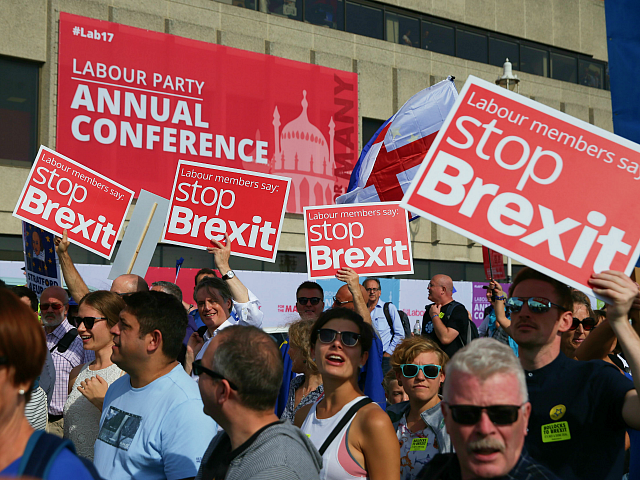A former Labour MP has criticised his party’s “absurd enthusiasm” for the anti-democratic European Union, a position he says conflicts with Labour’s traditional working-class agenda.
Austen Mitchell, who was the Labour MP for Great Grimsby between 1977 and 2015, wrote for BrexitCentral on Sunday that the party’s “euro-enthusiasm” is a sign of the “Blairite” rejection of the party’s left-wing roots, saying that “EU membership will stop Jeremy Corbyn doing much of what he wants (and needs) to do”.
“We want to nationalise the railways, but can’t under the railway directive,” Mr Mitchell wrote. “We need to boost the economy by Keynesian expansion, but can’t because the Stability Pact limits deficits. It also inhibits big surpluses, but this fair balance is ignored as Holland and Germany drain ever bigger surpluses out of their captive market.”
He added: “EU membership means no nationalisation, no state aid to protect jobs, no effective regional policy, no massive deficit financing to stimulate a flagging economy.
“Instead, Britain must continue to be drained and dragged down by a European Union, once dynamic but now on the brink of recession thanks to its German-inspired neo-liberalism. The alternative to breaking out and fighting back is slow, long-term decline into Europe’s consumer of last resort.”
The former Labour MP continued to make the left-wing case for Brexit by saying that “the only instrument Labour has found to advance the cause of the people” was under the “democratic control” of “the nation-state” — an institution being eroded by the globalist-progressive European Union.
“The nation-state put Britain ahead of Europe in developing labour and union rights and advancing women workers. Even now anything the EU can do (which is little enough), our own government can do better” — a challenge to Labour-Remain claims that diverging from Brussels will result in a loss of workers’ rights.
“We’ve undermined our roots among the workers and in the old industrial areas to become a middle-class party dominated by the interests and aspiration of a dominant middle class which benefits from globalisation, Europeanisation, financialisation, deindustrialisation, and rocketing house prices,” he added.
Labour has been turning away from its working-class base and embracing the metropolitan elite for decades. After World War Two, the party had kept the UK out of the European Coal and Steel Community, the first iteration of a European ‘union’; a the 1962 party conference, former Labour leader Hugh Gaitskell opposed Common Market membership; and Labour Party members campaigned against UK membership of the European Economic Community in 1975.
Historically, several heavy-hitters in the party were strongly Eurosceptic, including Tony Benn, former party leader Michael Foot, and Peter Shore, who delivered the powerful “Fear! Fear! Fear!” speech ahead of the 1975 referendum, the memory of which was revived for the 2016 vote as Brexiteers battled against the Remain machine’s own Project Fear.
Brexiteer stalwarts maintained a presence in the party until recently, but they are fast dwindling. Kate Hoey announced in July 2019 that she was standing down at the next election, Frank Field resigned the Labour whip in August 2018 over party antisemitism, and in September 2019 John Mann announced he would be quitting the Commons — again, over Labour’s antisemitism scandals.
A highly contradictory figure in Labour’s Brexit dialogue is the party’s leader, Jeremy Corbyn. A student of socialist Eurosceptic Tony Benn, Labour Leaver campaigner Brendan Chilton described Mr Corbyn as the “most Eurosceptic Labour leader since Michael Foot”.
Prospect magazine outlined in February Mr Corbyn’s previous anti-EU sentiment thus:
Like his mentor, Tony Benn, Corbyn had been a Eurosceptic since the 1970s. He voted against membership in 1975, opposed Labour’s pro-European turn in the 1980s and condemned the creation of the European Union in 1993 as “a bankers’ Europe” that would “endanger the cause of socialism”. He viewed the EU as an undemocratic, capitalist project that aspired to a “European empire”; a “military Frankenstein” that was “subservient to NATO,” governed by “an unelected set of bankers”.
Making such comments as recently as the last decade, it came as a surprise that in 2016, having been elected as party leader the year before, Mr Corbyn campaigned for Remain. However, the media remarked on his lacklustre battle to keep the UK in the EU.
The June 2016 referendum revealed the divergence of Labour’s political establishment and its voters. While 90 per cent of the party’s MPs voted Remain, 70 per cent of Labour constituencies voted Leave. This disconnect is also present in Corbyn’s top team, which is also heavily London-centric. Sir Keir Starmer, Emily Thornberry, Diane Abbott, and John McDonnell all sit for London constituencies. Both Corbyn and Thornberry’s seats are in Islington — the spiritual capital of London’s metropolitan elite.
Pledging to abide by the referendum decision in his 2017 election manifesto, Mr Corbyn betrayed the estimated five million Labour Leavers in the heartlands of the Midlands, Northern England, and Wales when in July 2019 he announced he backed a second referendum. The party voted in favour of a motion to make a second referendum an official Labour position in September.
After Mr Corbyn’s statement in July, Brexit Party leader Nigel Farage warned that Labour would be “devastated” in the next election for “betraying” Labour leavers. A study found last month that that without a natural home, Labour Leavers are more likely to consider voting for the Brexit Party than the Conservatives.

COMMENTS
Please let us know if you're having issues with commenting.